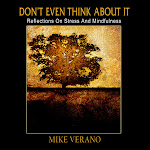
Show me a sane man and I will cure him for you.
Carl Jung
"The unlived life is not worth examining" is an adage that has stuck with me since I first heard it in an introductory counseling class. Over the years I have come to realize that thinking about life should never take the place of actually living life. I say this with the humility of a recovering self-help book junkie.
Carl Jung
"The unlived life is not worth examining" is an adage that has stuck with me since I first heard it in an introductory counseling class. Over the years I have come to realize that thinking about life should never take the place of actually living life. I say this with the humility of a recovering self-help book junkie.
The allure of self-help literature is great. The Western mechanistic model we have grown up with tells us that we are works in progress and that we need only study the right owner’s manual to have a happy and meaningful life. Once we discover the secret to the purpose driven life we can begin to attract all manner of material goods, live in bodies that never age with minds that never fail, and find that one special person with whom we can spend the rest of eternity. At least that is what I read in the book, Have It All: The Last Book You Will Ever Need to Read.
Ironically, the self-improvement movement may create more stress than it relieves, as it often leaves its followers feeling inadequate and just a few karmic cycles short of being enlightened. The underlying message seems to be "you will never be happy as you are now, so you had better start making some serious changes before time runs out." The destructive power of stress is directly related to our belief that the ego is the sum of our existence and that we only have a limited amount of time to whip it into shape. If that doesn’t get the cortisol pumping, I don’t know what will.
I want to suggest a gentler path through the often rocky terrain of self-acceptance. I propose that the self that most self-help literature is trying to fix is none other than the egoic self. This self, as the Buddha and many others have pointed out, is actually a mirage that doesn't exist outside of our heads. Alan Watts puts it very plainly when he said "the reason you can’t change you is that you don’t exist." The ego, as a mind-made entity, will always need work. We can always add something to this self; teach it a new skill, rid it of a bad habit or help it become the next American Idol. Our true self is complete and perfect already. It stands patiently in the shadow of the ego waiting for it to finish taking bows so that it might reveal what the show was all about in the first place.
When his followers asked how they could go on without him, the Buddha responded "be a lamp unto yourselves." The great mystic, Kabir, used to look out at his followers and exclaim, "To whom shall I preach?" because he saw the divine spark of God rather than sin in all their eyes. Jesus said "you are the light of the world." What happened? Who turned the lights out? The good news is that we don’t need to stumble through our lives in search of an itty-bitty book light for illumination. We simply need to pull up the shade of thought that filters out the light. After that, it is just a matter of stepping out into life. Oh, and bring a book, it can get boring at times. May I humbly recommend The Healing Power of Stress? It is the latest offering in my brand new category of "Non-Self Help."








